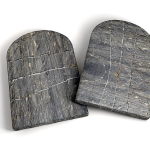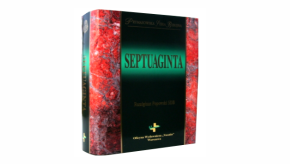Which Bible is True? How to Search the Scriptures?

Biblical skeptics are very right when they say that Bible translations are inaccurate or even fragmentarily distorted.
But this fact is not a reason to reject, not read, not analyze the Bible, or to even say that it is false.
The teachings of Christ, transmitted directly or through the Apostles, are obligatory for us. They need to be researched and implemented. Even though there is one Bible, we have numerous translations of the Scriptures and numerous interpretations of various religions, which are most often mutually exclusive.
To properly research a given biblical topic, you should list all the verses on that topic and then check the correctness of the translation.
You should do it yourself. Everyone, and every servant of Christ, should learn to check the correctness of the translation of a given verse. That is, someone shows you a given verse, and before you express your opinion, before you nod, you will check for yourself what the true notation/meaning of this verse is:
“The people of Berea were more open-minded than the people of Thessalonica. They were very willing to receive God’s message, and every day they carefully examined the Scriptures to see if what Paul said was true.” – Acts 17:11.
“Don’t despise what God has revealed. Instead, test everything. Hold on to what is good…” – 1 Thessalonians 5:20-21.
Bible for Reading
I recommend the online Bible from the website: Biblehub.com
It is very good for reading and for checking the meaning of given verses. Keep in mind that it lets you choose from many different versions and translations of the Bible, and some are going to be more accurate and better than others. (Also, most will use the false name of Christ and possibly other false names)
Another suggestion is a good version of the Septuagint.
The name comes from the Latin word Septuagint (meaning seventy) and is a translation of the Hebrew Scriptures and some related texts into Greek – koine.
Otherwise, we call the Septuagint LXX. This is an abbreviation referring to the seventy scholars who completed the translation of texts in the second century BC.
It is written in easy-to-understand text.
It presents only the Old Testament.
Other Bibles are the ones we usually have at home.
And here’s a little note. These Bibles are not used to analyze verses or to check the accuracy of a translated word. For this purpose, we use the so-called Interlinear Bibles, meaning those that have numbered words in verses.
Now let’s move on to Bibles like these.
Bibles for analyzing topics
Interlinear Bibles are used to study biblical topics. To research such a topic, we must be sure that the verses on which we base our opinions are correctly translated. That is, first we collect verses from a given topic, then we check the correctness of their translations.
This is a time-consuming task, but very interesting, because step by step, we discover the true message of God.
Here is one of the best online interlinear Bibles:
https://biblehub.com/interlinear/genesis/1-1.htm
It has the most extensive dictionary.
How to use Biblical dictionaries?
The most important thing in these Bibles is the numbering of a given word in a verse. Each word has its own number. We find this number in paper or online dictionaries.Yeshu/
Let’s see an example of the word Yeshu–Yesu with the number 2424. This is the form of Christ’s name in Hebrew: Yesu and in Greek: Yesu plus variations of this name. Notice that in Greek there is NO letter „s” in the end of Christ’s name: Jesus.
When translating, the dictionary automatically changes the letter „Y” to „J” and adds an “s” at the end. This is a big distortion. As you search the Scriptures, you should also look out for the following errors that interlinear Bibles and dictionaries contain:

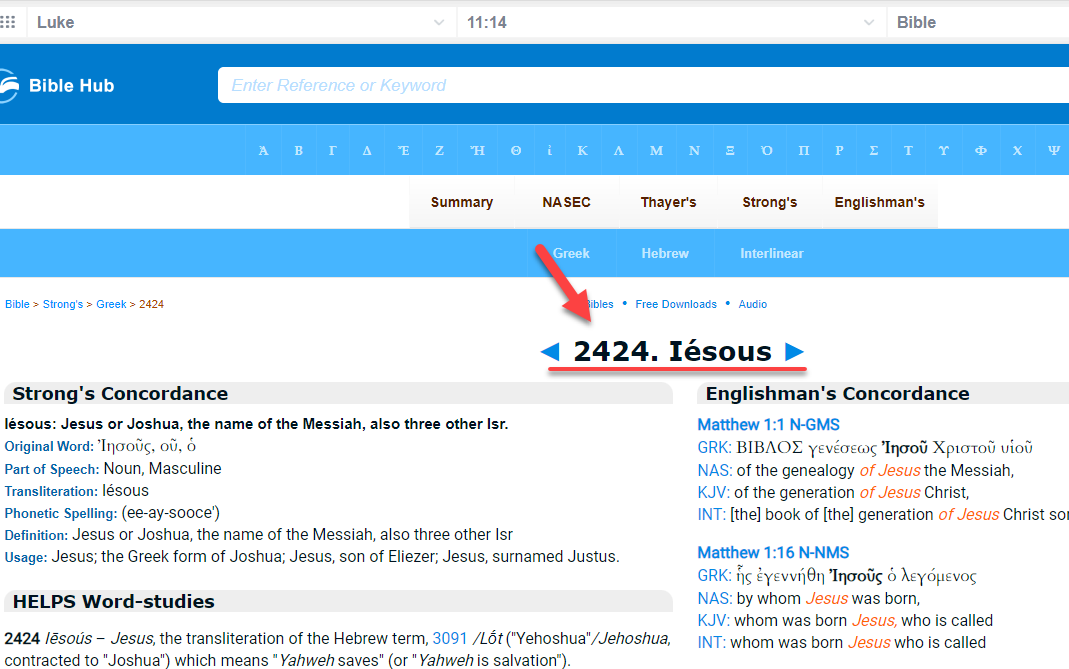
https://biblehub.com/greek/2424.htm
A deep examination of the Scriptures
Interlinear Bibles and dictionaries… lie. Unfortunately…
Therefore, we need to apply a deeper examination of a given word. A good example is the word: jew.
There is actually no such expression in the New Testament. Where translators entered the word: Jew, it should usually be: Judean.
To discover such lies, you need to check what word the word in question is derived from. In our example, the word: jew, if it is true, should be derived from the word: jew.
Is this really the case?
NO
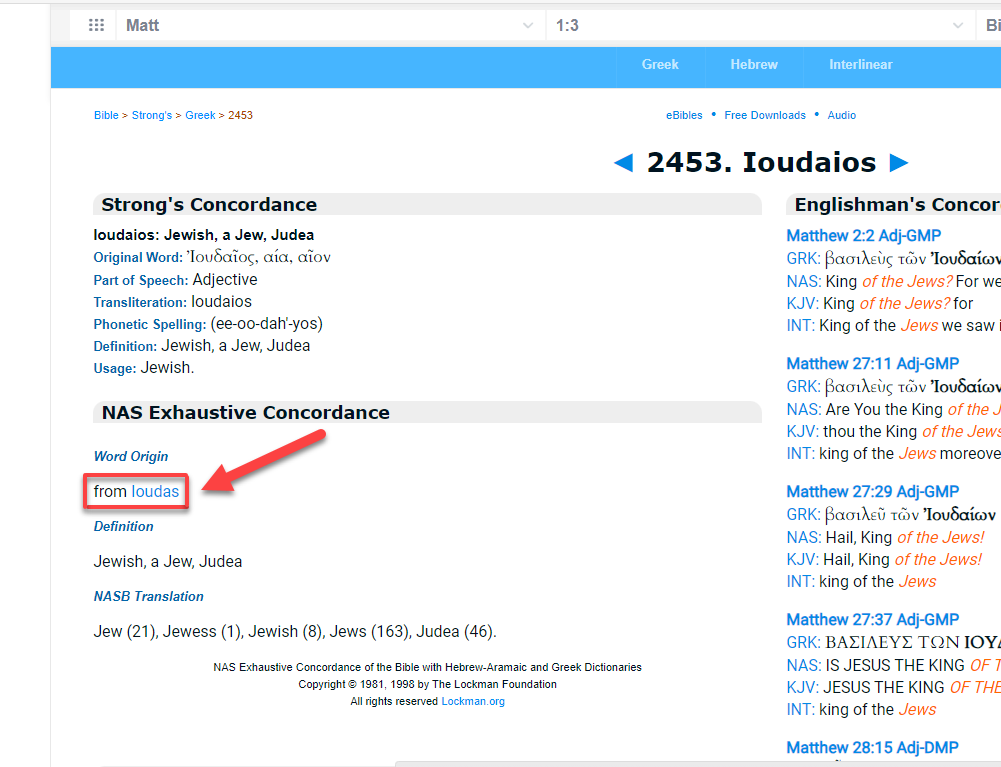
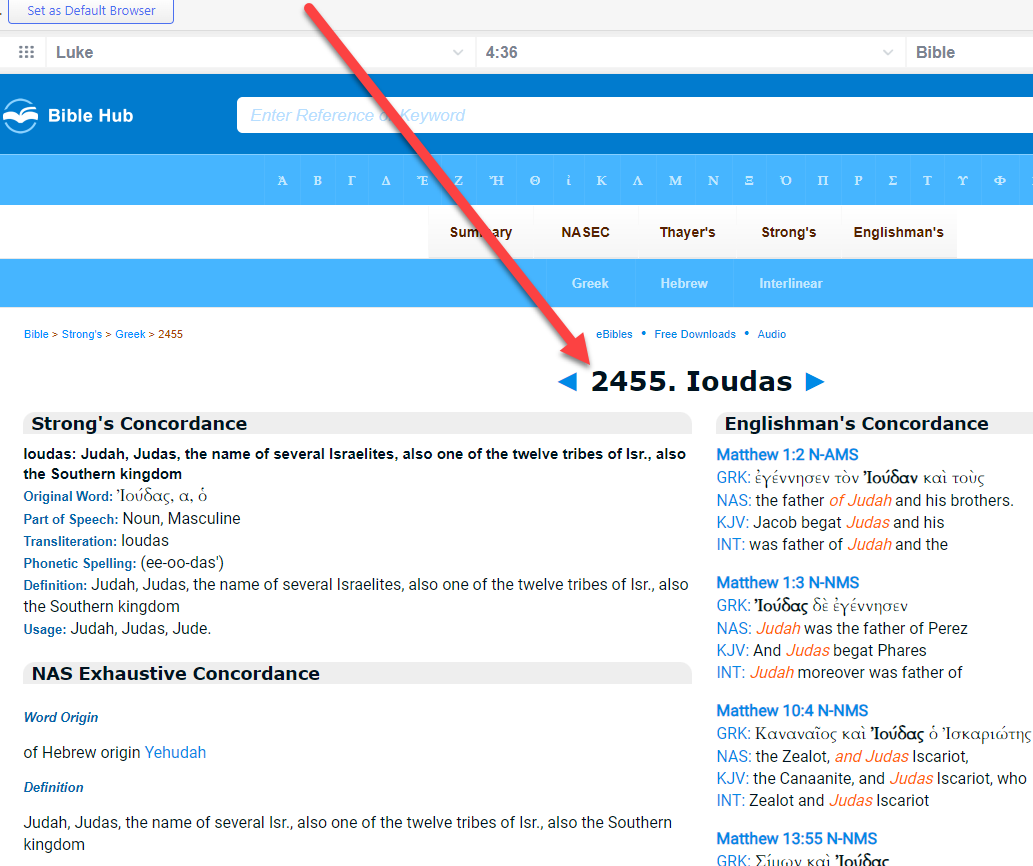
https://biblehub.com/greek/2453.htm
Summary
It is really worth learning to check the accuracy of translated verses. This is as basic knowledge and skill as writing and reading.
There are many people who speak beautifully about love and God, but they promote false doctrines and false teachings:
https://zastopujczas.pl/biblia/english/what-spirit-is-guiding-him-how-to-recognize-liars/
It will be difficult to recognize their fakeness if you, the Reader, focus on listening and on the person’s appearance. Maybe you have an e-book in your hand, beautifully prepared, where the author uses Biblical dictionaries and online Bibles.
Don’t just trust this kind of person but verify them first.
Author: Robert Brzoza
Translator: Hubert Brzoza




























